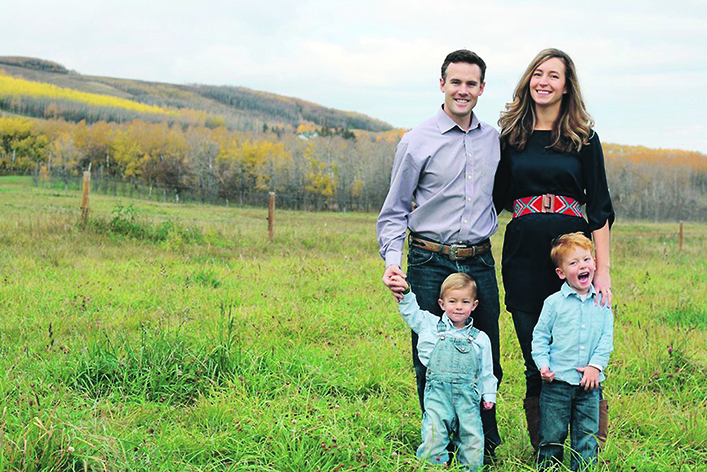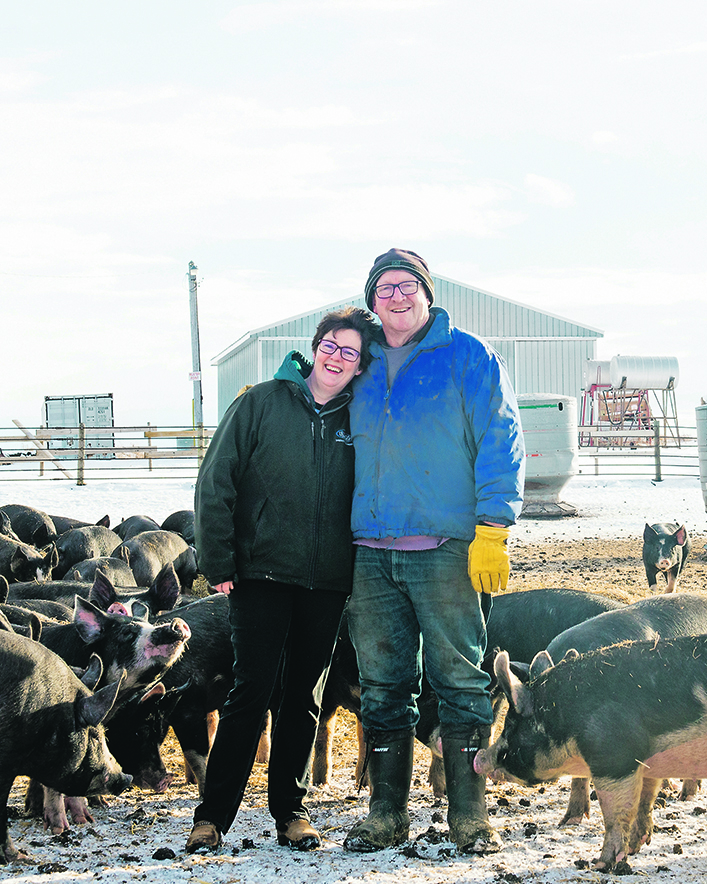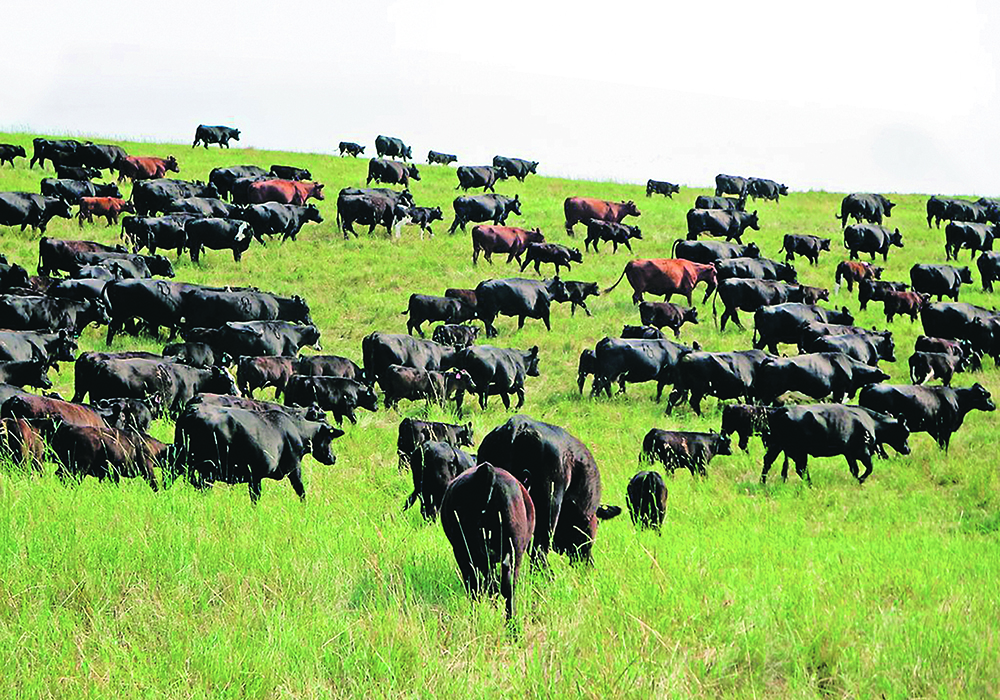Food shortages at the outset of the pandemic sent consumers scrambling to fill their freezers and larders with local food
Consumers facing the growing uncertainty of the COVID-19 crisis are seeking the security that comes from having a freezer full of locally-produced food, said an Alberta rancher.
“Our sales have been just sky high,” said Ben Campbell, who sells directly to local customers from his Grazed Right business on the Tullichewan Ranch near Black Diamond, Alta. He sold more beef in March and April alone than he normally sells in an entire year.
Campbell and his wife, Stephanie, raise everything from free-range farm eggs and roasting chickens to heritage pasture pork on the ranch, which is about a half-hour’s drive southwest of Calgary. Their cattle are grass fed and raised without hormones, after which they are taken to a local butcher.
Early in the pandemic, outbreaks at Canada’s largest beef processing plants sickened and killed workers, forcing temporary shut downs. “People were nervous. People were scared,” said Campbell about the mood of his customers at the time.
“They were asking, ‘How are we going to have beef?’ … They weren’t asking anything about the product itself or the price. They just wanted to know about if the supplier was going to be there.”
Customers at Grazed Right typically order about 50 to 100 pounds, “and so then they’re able to fill their deep freeze, and then they don’t have to go to the grocery store to buy that meat,” he said.

Demand also increased at Irvings Farm Fresh, which raises free-range Berkshire pigs near Round Hill, Alta. Nicola Irving and her husband, Alan, raise them without hormones or antibiotics.
The pigs are slaughtered at a provincially-inspected meat processing facility on the farm, allowing the direct sale of everything from bacon, ham and sausages to British-style pork products, she said.
Although it is about an hour’s drive southeast of Edmonton, “and kind of out in the middle of nowhere,” the store on the farm was receiving several visitors a day at one point during the pandemic, said Irving.
“They obviously could come and shop here because we were selling essential goods, but it was an excuse for them to just take a road trip and get away from the four walls they had been contained in.”
Read Also

New program aims to support plant-based exports to Asia
Understanding the preferences of consumers in Taiwan and how they differ from Indonesia or Malaysia isn’t easy for a small company in Saskatchewan.
Pork is one of the less expensive meats “and when people are struggling financially and they’re eating at home more – but they still want to support local, and they still want to know where their food comes from, or their meat comes from – then that’s why I think we were particularly busy compared to some other people,” she said.
Besides deliveries to customers such as retail stores and restaurants in several Alberta communities, including Edmonton and Calgary, the farm also makes limited home deliveries in Edmonton.
“I’ve got customers that are immune compromised or they work in health care, and they don’t want to be mingling in farmers markets or whatever. I try to look after those people first.”
Cooking at home has become an important pastime for many people forced to limit their activities by the pandemic, said Gary Vander Waal, president of the Alberta Farm Fresh Producers Association. The non-profit group represents more than 200 direct market growers involved in everything from vegetables, fruit and meats to wines and bedding plants.
Sales overall “have been very good because there’s just a bigger demand for that locally-grown produce, and whether that’s chicken or whatever everybody is growing, the demand is higher for that and it seems like there’s more support of the local economy,” he said.
It comes at a time when many farmers have enjoyed a “fantastic growing year” and good prices in 2020, said Vander Waal, who grows garlic and root vegetables near Picture Butte, Alta.
At least a third of the association’s members are u-pick farms, which received a boost from people looking for safe outdoor activities, he said.

The association created a committee to provide COVID-19 guidelines to ensure customers were kept safe, he said.
“There’s been lots of reports of (farms) being sold out at 9:30 in the morning, and so that tells me that there was definitely not a problem with people coming out to u-pick.”
Farmers markets are an important source of revenue at Irvings Farm Fresh, with sales holding steady at about 60 per cent of the business. But the pandemic has caused the Alberta Farmers’ Market Association to lose members, said Irving, who is also the group’s president.
Some non-food vendors such as artisans are dropping out because they are no longer getting enough sales, she said. “We’ve lost small businesses that are probably never going to come back.”
Twenty-one out of 141 approved farmers markets in Alberta decided not to open during the pandemic, she said. They mostly involved smaller markets in rural areas, many of which are run by volunteers out of facilities such as community halls, she said.
Rural leaders need to make more of an effort to permanently house such markets because they bring customers and revenue to small-town businesses, said Irving.
But even markets in Alberta’s major cities have faced challenges, such as the Old Strathcona Farmers Market in Edmonton. Irving estimates it usually attracts up to 20,000 people per day, but pandemic safety measures limiting crowds caused totals to drop as low as 2,000 to 3,000.
What was once an immersive experience that included everything from musicians and singers to food trucks and customer samples has been limited at times to essential food services, she said.
Several farmers markets have implemented customer pre-ordering for curbside service, said Irving. The association is also tentatively looking at creating an online digital marketplace for all approved markets in Alberta, she said.
People are going to have to learn to adapt to the pandemic as the weeks and months go by, said Irving. “And always we’re aware that there might be a second wave, and I think it’s clear that we’re in it right now.”


















